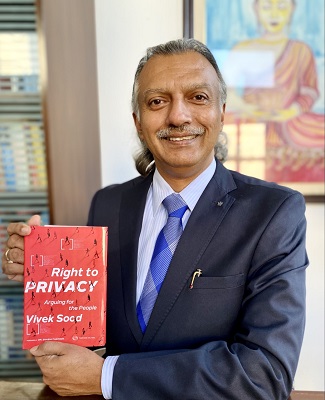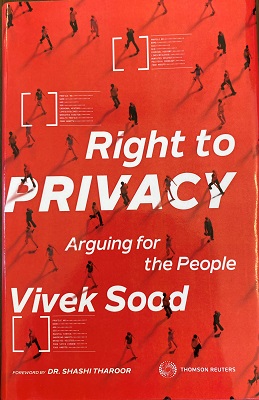
-
Authored by Senior Advocate Vivek Sood, the book was unveiled by Hon’ble Justice Sanjay Kishan Kaul, Supreme Court of India, Hon’ble Justice Siddharth Mridul, Delhi High Court and academician Prof. Upendra Baxi. -
Prominent personalities from the society have also extended support and solidarity towards the subject. -
The hardbound book is about the recognition of Right to Privacy by the Supreme Court in Puttaswamy’s case, its impact on the lives of Indian citizens, and the three major controversies of 2021- the controversial Intermediary Rules, 2021, Toolkit dispute between BJP and Congress, and the Pegasus allegations.
‘Right to Privacy: Arguing for the People’, authored by Senior Advocate Vivek Sood was launched nationally on October 6 through a virtual event. The book was unveiled by the Chief Guest Hon’ble Justice Sanjay Kishan Kaul, Supreme Court of India and Hon’ble Justice Siddharth Mridul, Delhi High Court was the Guest of Honour. Leading academician Professor Upendra Baxi gave the keynote address on ‘Compliance and Enforcement of Right to Privacy: An uphill task?’.
 |
Senior Adv. Vivek Sood at the Virtual Pan India Book Launch – ‘Right to Privacy: Arguing for the People‘
The foreword is penned by Shashi Tharoor, Member of Parliament, Lok Sabha. The book has received a fantastic response from Mukul Rohatgi, Senior Advocate and Former Attorney General for India, Manish Tewari, MP, Lok Sabha and Former Minister of Information and Broadcasting and Rajdeep Sardesai, News Anchor, Journalist, and Author.
The author has fearlessly and clearly addressed the three major controversies of 2021 with respect to the Right to Privacy – the controversial Intermediary Rules of February, 2021, Toolkit dispute between the BJP and Congress, and the allegations against the Government of misusing Pegasus to pry into the lives of prominent political personalities, Judges, rights activists, and senior lawyers amongst others.
Speaking on the occasion during the book launch, Author Vivek Sood said, “I have tested the Constitutionality of the Intermediary Rules of 2021 based on the principles of unreasonableness and arbitrariness. Are the powers conferred upon the law enforcement agencies to intrude into the privacy of the citizens for finding the first originator of certain digital messages, over-broad? I have then addressed the Toolkit dispute between BJP and Congress to make out a case for reforms in the area of enforcement of the Right to Privacy. I have also answered the controversial question – Is a case of violation of the Right to Privacy made out against the Government on allegations of using Pegasus to snoop into the lives of prominent political personalities, judges, activists, and lawyers?”
 |
Book Cover – ‘Right to Privacy: Arguing for the People‘
The hardcover book is about the recognition of Right to Privacy by the Supreme Court in Puttaswamy’s case and its impact on the lives of Indian citizens. It does not use legal jargon and has been written keeping in mind the general readers. The author has covered varied topics like privacy related vulnerabilities of Aadhaar, significance of informational privacy, privacy issues on social media, right to adult entertainment in private domain, personal data protection, LGBT rights and many more.
“The concept of privacy has undergone a lot of changes with time. As we move towards becoming a digital economy and increase our reliance on Internet based services, we are creating deeper and deeper digital footprints – passively and actively. With the advent of social media, every aspect of our day-to-day life has become digitized, and every individual is now at a greater risk of experiencing a violation of their privacy. The book highlights the need of an intelligible data protection law and why all the privacy policies and terms of services of non-State entities must be approved by independent expert bodies appointed by the government to ensure they do not permit the violation of the right to privacy and follow the principles of proportionality, purpose, and necessity,” explains Author Vivek Sood.
Articulated in six chapters, the book has been published by Thomson Reuters. The first part of the book deals with the citizen’s democratic and fundamental right to informational privacy that has been recognized by the Supreme Court of India, and debates on whether the Aadhaar will prove to be the most valuable instrument for delivering social welfare benefits or a nemesis in terms of violation of the right to privacy. The latter half highlights the ‘right to privacy’ of the citizens in the context of interactions in social media, transactions with e-commerce businesses, and how the fundamental ‘right to privacy’ is ushering transformational changes in the society. The book elaborates on how unconsciously users are sharing personal information and thus creating a digital footprint which helps enterprises to get consumer insights, trends and habits. Aggregation of data and information about individuals leads to re-creation of the virtual persona of citizens.
Professor Upendra Baxi in his keynote address said that enforcement of this fundamental right would be amongst the major challenges the global society will face.
The event was hosted by LiveLaw and members from the legal fraternity, corporate, IT professionals attended the virtual launch. The book is available for sale at Amazon and Thomson Reuters .
The author is a Senior Counsel based in Delhi with close to three decades of litigation experience in criminal law, constitutional law and commercial disputes. He has authored several books like- “The Fundamental Right to Internet” (2011, Nabhi); “Cyber Laws Simplified” (2001, Tata Mcgraw Hill); and “Cyber Crimes, Electronic Evidence & Investigation: Legal Issues” (2010, Nabhi); and “Emergence of Commercial Justice: Insolvency & Arbitration” (2021, Bloomsbury). His present work, “Right To Privacy: Arguing For The People”, is his 5th publication.
